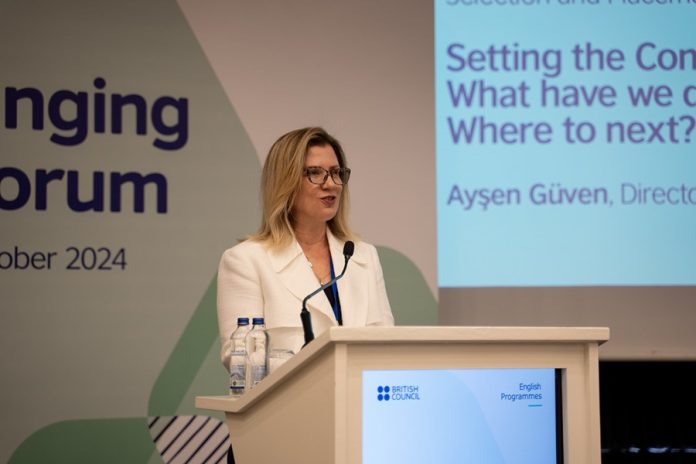Attending the recent forum in Türkiye, Wayne Trotman reports on the insights into the past, present and future of English language education.
In November, 2015 I had the pleasure of attending and reporting for the Gazette on the rollout of the British Council report, ‘The state of English in higher education in Turkey’.
Ten years, and several further insightful reports later, including a recent one in 2023 on artificial intelligence, I was again delighted to accept the invitation to the British Council Türkiye English in a Changing World Forum which would take stock of all such reports and assess impact along with outcomes achieved.
‘It’s a forum, and not a conference,’ Ayşen Güven, British Council Director Education Türkiye explained to me over lunch on Day One. ‘We’ve invited key partners and collaborators, both local and international, to help us reflect on progress we’ve made in the past decade and highlight goals to guide us towards an even better future.’
Highly placed figures were certainly evident throughout the two-day event, held in the Ankara Hilton. These included: Dr Yusuf Akbaş, Deputy General Director, Teacher Training and Development Directorate, Ministry of National Education; Professor Güven Sak, President of TEPAV, The Economic Policy Research Foundation of Türkiye; and TESOL Türkiye President, Evrim Üstünlüoğlu. Also in attendance was Chris Graham, Vice-President IATEFL, and Sezin Dereci Kösem, Sabanci Foundation Programme Manager.
Opening the proceedings, Country Director for British Council Türkiye, Gill Caldicott pointed out that the British Council was celebrating 90 years since its inception; and its 84th year in Türkiye.
‘Last year alone,’ she explained, ‘we delivered more than 30,000 exams, and 23,000 teachers accessed Teaching English, which provides support for teachers of English. An example of what we know is significant demand for English and we believe a very real need for the country to build on its already impressive potential.’
Following this, Ayşen Güven, recently awarded an MBE for, in the words of the UK Ambassador to Türkiye, ‘…transforming the way English teaching is delivered in Türkiye,’ set out the context:
‘The main purpose of the forum is to assess the impact of reports and subsequent projects related to 2013 and 2015 surveys into the condition of English in state schools and higher education respectively, and by using our forces and working collectively, to shape the priority areas of work which can lead to innovative, scalable, impactful and sustainable partnerships.’
The first of the three scheduled panels on Day One explored what changes had been made in terms of technology, along with the needs of the labour market and the demand for English.
Dr Işıl Boy Ergül, founder of a digital ELT company in Türkiye known as Teacher X and ETZ, explained how AI, far from being a tool, was in fact a new dimension, explaining that claims for a teacherless classroom were baseless as learning coaches were still required in the room. ‘AI,’ she concluded, ‘is able to enhance learning, but could never replace it.’
The second panel discussed systems to support better English language outcomes for learners.
Didem Mutçalioğlu, President of the Accreditation Board—another valued partner with the British Council, and known in Türkiye as DEDAK—explained that in order to support learner outcomes there was a need for interconnected systems that rely on consistency and alignment. She concluded that ‘currently we do not have the right system.’
On the same panel, Richard Spiby, English Head of Assessment, Language Research British Council, explained the necessity of working in a triangle consisting of curriculum, delivery, assessment, and not treating assessment as a single entity. He felt there was an urgent need for assessment literacy.
It was also encouraging to hear from Professor Bayram Ali Ersoy, President of the Centre for Assessment, Selection and Placement (known in Türkiye as ÖSYM), who outlined a soon to-be introduced computer-based test in Türkiye known as E-TEP, and who, in his opening speech, said ‘…we aim to create areas where we can learn from each other by closely following the work being done in the field of language assessment internationally and by communicating with different practitioners.’
Following a scrumptious lunch, over which all participants discussed points raised, panel three on Supporting Teachers, moderated by Andy Hockley, took place.
Panellist Evrim Üstünlüoğlu explained how she believed professional development on a macro-level needed to be more meaningful and based on data, while on a micro-level it should involve learning opportunities and mentoring programmes.
Chris Graham of IATEFL felt the less motivated members of the ELT community should be encouraged more, and plenty of online material for them was available. More urgently, he energetically stated his policy of ‘No teacher left behind’. Far too many teachers are under privileged by living in rural areas with low connectivity, poor resources plus low English levels, he believed.
Day Two began with a round up by moderators of issues arising on Day One, during which Andy Hockley advocated a smoother transition for language students from the prep’ year to faculty classes, while both Evrim Üstünlüoğlu and Richard Spiby encouraged the coming together of stakeholders to assist with this.
Sustainable Futures, the final panel, was devoted to partnership models for equitable English language education. Sezin Dereci Kösem spoke of The Sabanci Foundation, which supported the British Council’s ‘English Together’ project, focusing on empowering teachers, regardless of gender. Along with the previous three, there were certainly plenty of clear issues from this panel for the British Council to work on in the near future.
During the evening closing reception at The British Embassy, kindly sponsored by ELT publishers Macmillan and Macenta, UK Ambassador to Türkiye, Jill Morris, shared her delight with all, explaining how during a recent visit to a local school, young Turkish pupils there had enlightened her in excellent English on artificial intelligence; evidence, if needed, of the work of The British Council, and that language teaching and learning programmes in Türkiye are in good hands.





